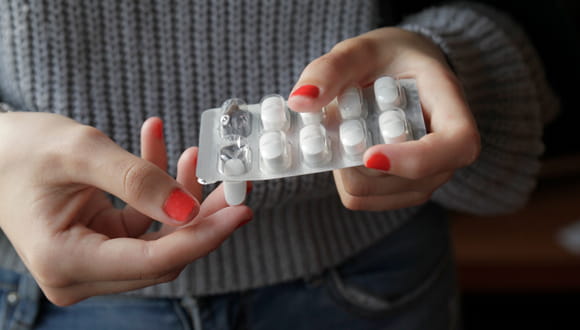How Do COVID-19 Antiviral Pills Work & Who Is Eligible to Receive Them?
Dec. 28, 2021 - Katie McCallumTreatment of mild-to-moderate COVID-19 is soon becoming more accessible to vulnerable people who need it most.
On Dec. 22, the FDA granted emergency use authorization (EUA) to Pfizer's COVID-19 oral antiviral product, Paxlovid — nirmatrelvir co-packaged with ritonavir.
The next day, on Dec. 23, the agency granted EUA to Merck's COVID-19 oral antiviral, molnupiravir.
This is welcome news since these oral antivirals are an at-home COVID-19 treatment option for those who are high risk of severe illness.
These medications also help fill the gap left by the two most commonly available monoclonal antibodies used to treat COVID-19, which, unfortunately, have proven to be less effective against the rapidly spreading omicron variant.
Who is eligible to receive oral antiviral treatment for COVID-19?
Both Paxlovid and molnupiravir will be available by prescription only. These antiviral pills won't be available by prescription to everyone, though, and the eligibility criteria differs for each.
Pfizer's Paxlovid will be available to people who:
- Have tested positive for COVID-19 and have not yet been admitted to the hospital and
- Are high risk for developing severe COVID-19 and
- Are 12 years of age or older (and at least 88 pounds)
Merck's molnupiravir will be available to people who:
- Have tested positive for COVID-19 and have not yet been admitted to the hospital and
- Are high risk for developing severe COVID-19 and
- Have no alternative FDA-authorized COVID-19 treatment options accessible to them or that are clinically appropriate for them and
- Are 18 years of age or older
Your doctor will help you understand whether you're eligible to receive an oral antiviral, as well as which option is best for you.
What's the difference between the two COVID-19 pills?
Both the Pfizer and Merck COVID-19 pills are antivirals, working to keep the SARS-Cov-2 virus from replicating properly — thereby reducing viral load, which can help reduce symptom severity.
However, each pill does so in a slightly different manner.
How Pfizer's COVID-19 pill, Paxlovid, works and is administered
Paxlovid consists of two pills taken together, nirmatrelvir and ritonavir.
Nirmatrelvir prevents key proteins that the virus needs to make more copies of itself from functioning properly. It's taken in combination with ritonavir, which helps keep nirmatrelvir from being broken down before it has completed its job.
When studied in clinical trials, Paxlovid reduced COVID-19-related hospitalizations by almost 90%.
How Paxlovid is administered:
- Three tablets (two tablets of nirmatrelvir and one tablet of ritonavir) taken together orally twice daily for five days
How Merck's COVID-19 pill, molnupiravir, works and is administered
Molnupiravir works by introducing mistakes into the virus' genetic code, preventing the virus from replicating properly.
When studied in clinical trials, molnupiravir reduced COVID-19-related hospitalizations by 30%.
How molnupiravir is administered:
- Four tablets taken orally every 12 hours for five days
Do I still need to take COVID-19 antiviral pills if I'm not feeling sick yet?
If you've tested positive for COVID-19 and meet the criteria above, call your doctor as soon as possible to discuss whether this treatment may be right for you.
For antiviral pills to be most effective, they need to be taken as early in the disease course as possible and within five days of symptom onset. The sooner the better — even if you're not feeling symptoms yet.
Are there potential side effects to taking COVID-19 antiviral pills?
As with most medications, there are side effects to taking these oral antivirals for COVID-19.
They also have the potential to interfere with other drugs and impact other health conditions, so be sure to discuss the medications you're taking and preexisting health conditions you have with your doctor.
Side effects of Paxlovid include:
- Impaired sense of taste
- Diarrhea
- High blood pressure
- Muscle aches
Paxlovid is not recommended for people who have severe kidney or liver impairment.
Side effects of molnupiravir include:
- Diarrhea
- Nausea
- Dizziness
Molnupiravir is not recommended for use during pregnancy, unless your doctor determines that your individual benefit of taking this drug outweighs the known risks.
COVID-19 pills vs. COVID-19 vaccines: Do I still need to get vaccinated?
Neither Paxlovid nor molnupiravir is authorized for pre-exposure or post-exposure prevention of COVID-19, and neither can substitute the need for vaccination.
Despite the availability of these medications for some people, it's critical for everyone who can get vaccinated to get vaccinated against COVID-19.
We know the vaccines are safe, effective and our best defense against the virus. Even if you've had COVID-19, get vaccinated. The immunity offered by vaccination is stronger and lasts longer than natural immunity.
Plus, data shows that unvaccinated adults are twice as likely to get reinfected with COVID-19 than those who get vaccinated after recovering from their illness.
Whether you're hesitant about COVID-19 vaccines or incorrectly assume you can't get COVID-19 twice, make sure you're reading trusted information about the vaccines and reach out to your doctor if you have any unanswered questions.
And if it's been some time since your first dose or doses of COVID-19 vaccine, now is the time to get your COVID-19 booster if you're eligible — especially as we continue to learn more about the new COVID-19 variant, omicron, which is spreading rapidly.








